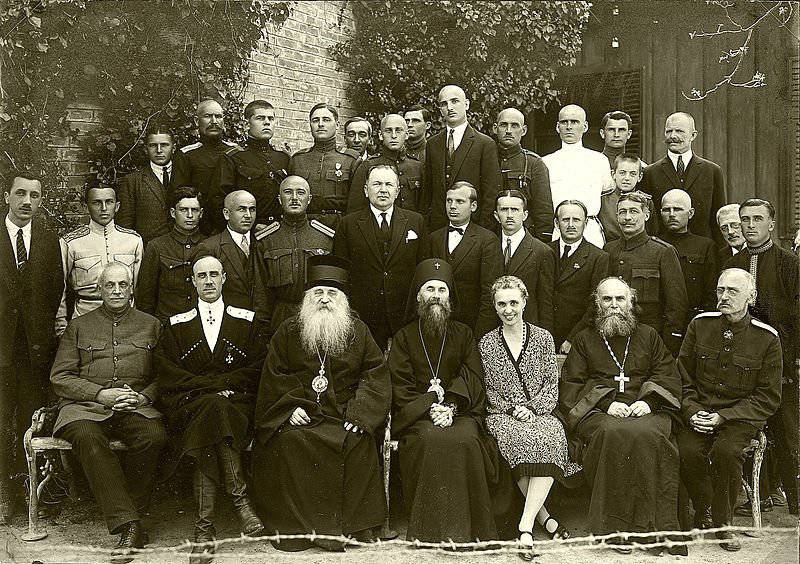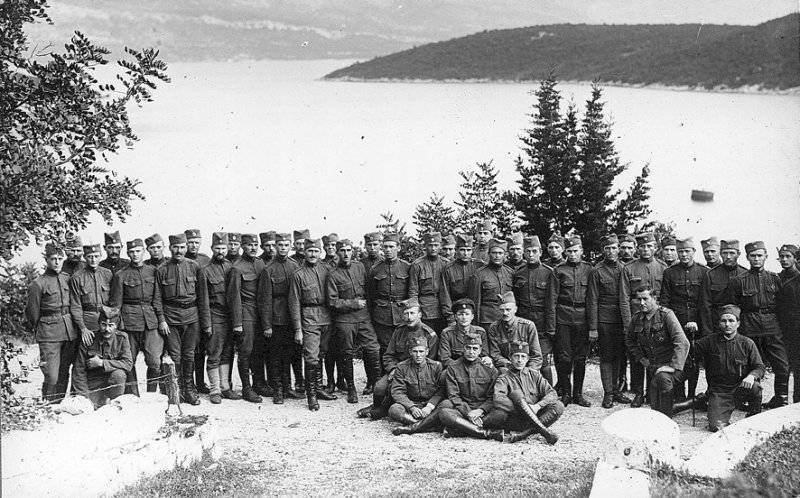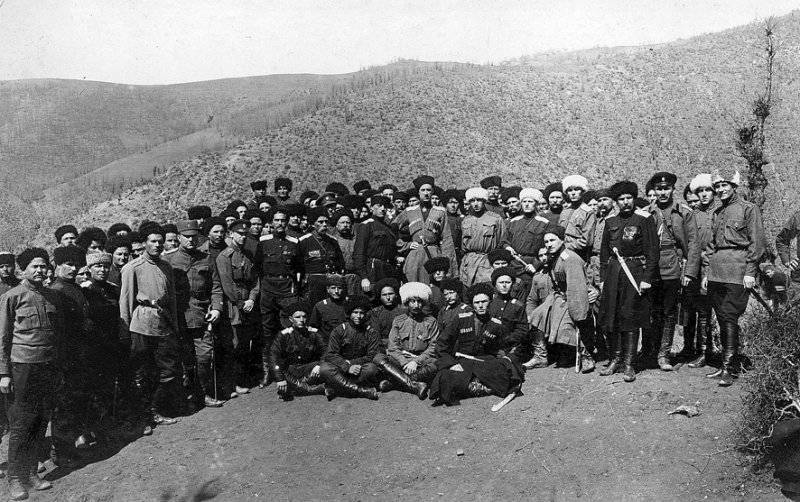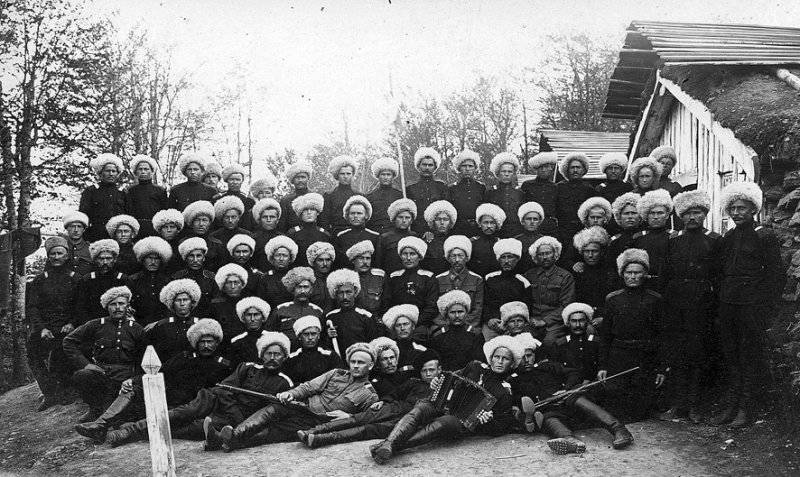Wrangel Army in the Balkans
Cavalrymen serving in the Border Guard of the Kingdom of Serbs, Croats and Slovenes.
After the White Army moved from Turkey to the Balkan Peninsula, the Don Corps was deployed in southern Bulgaria. The headquarters of General Abramov is located in Stara Zagora. The 1 Corps was located in Northern Bulgaria, its headquarters in Veliko Tarnovo. Parts of the corps were stationed in the empty barracks of the Bulgarian army, which was disbanded after defeat in the First World War. The troops were stationed in Svishtov, Sevlievo, Nikopol and Belogradchik. In Sofia, was the representative of the commander in chief, supply management. An amount sufficient for supplying the corps with food during the year was placed in the Bulgarian bank. The Bulgarian commissarity, after the dissolution of the majority of the army, which had significant surpluses, gave White uniforms, cloth, and leather for shoes. By the order of Kutepov, from the end of January 1922, the troops have already begun regular peacetime training.
The Bulgarian public has met the whites in two ways. On the one hand, the government, the right and moderate public supported the army of Wrangel, recalled the contribution of the Russians to the creation of the Bulgarian state, the joint struggle of the Bulgarian and Russian peoples with the Turks. The Bulgarian government allowed White troops to replenish with civilian refugees from Russia who would like to join the ranks of Wrangel’s army. On the other hand, in Bulgaria, the Communist Party strengthened its position and leftist sentiments were very strong. Even rallies and demonstrations began, with demands to put whites on ships and send them to Soviet Russia. In addition, Moscow also tried to exert pressure on the Bulgarian government. In April, the 1922 of the year was followed by a note from the Ukrainian SSR, where a protest was expressed about the stationing of Wrangel troops in Bulgaria. It was stated that in the event of the actions of the white troops from the territory of Bulgaria against the Ukrainian SSR, they would be considered as regular Bulgarian troops, which would lead to conflict between the countries.
In the Kingdom of Serbs, Croats and Slovenes (CAS), the Barbovich Cavalry Division was enlisted in the border guard. Cossacks Fostikova located in the area of the city of Vranje, where they led the construction of the highway to the Bulgarian border. Technical parts were sent to the railway work. The Nikolaev Cavalry School, the Crimean, Don and Russian Cadet Corps were stationed in Belaya Tserkov. Many Russian officers were enrolled in the gendarmerie. In Yugoslavia, all military ranks that officers had before the revolution were retained. In addition, all Russian diplomas and academic titles have retained their values in the Kingdom. The headquarters of General Wrangel and the commissariat were located in the town of Sremski Karlovci. Miller became Chief of Staff, replacing Shatilova, who was very tired of recent events. Wrangel had “official” representatives in Belgrade, Sofia, Prague, Paris, Budapest and Bucharest. In a number of countries there were military agents. To communicate with them, the headquarters of Kutepov and Abramov, a department of diplomatic couriers was organized at the headquarters of the commander-in-chief.
Regarding the situation of Wrangel’s army in the Kingdom, Minister of Foreign Affairs Pinchich said that Wrangel enjoyed the law of hospitality, his stay was neither political nor military. The Kingdom does not recognize Wrangel as the legitimate head of the Russian government and will refrain from making any commitments that could lead to war with Russia.
Commander-in-Chief of the Russian Army P. Wrangel in 8 of the Linear Hundred of the 1-th Consolidated Kuban Regiment. April 1922
Wrangel's army scattered throughout Bulgaria and Yugoslavia, in general, continued to maintain combat capability. According to the mobilization plans, four divisions could be deployed within 5 days. The headquarters of Wrangel began negotiations with the Romanian government on the passage of the white army through the territory of Romania, in the event of the start of the war of this country with Soviet Russia. Wrangel even proposed to conclude a union agreement with Romania, where the interests of the parties were to be coordinated by Alexander, the King of Serbs, Croats and Slovenes. The possibility of accommodation in Romania, closer to the borders of Russia, 15-th. enclosures. Some Romanian politicians tended to accept these proposals, since relations between Romania and Soviet Russia were strained. After the revolution, the Romanians occupied part of Russian territory and were generally hostile to Soviet Russia. In addition, there were concerns about the subversive activities of the Soviet special services and the Comintern. The deployment of white troops was seen as a measure that would reduce the threat from Moscow.
Wrangel Headquarters assumed that peace between the Western powers and Soviet Russia would not be long. The war according to the forecasts of whites was supposed to resume as soon as possible. It was believed that initially the war would be defensive in nature for European states when the Bolsheviks wanted to rekindle the flames of revolution in Europe. The main theaters of hostilities were to become Southern Europe, the Balkans. Based on the analysis of the political situation and intelligence data, Wrangel Headquarters believed that although the Romanian army was reinforced by the French in material and technical terms, it was still weak in fighting spirit, therefore it was given no more 2-3 weeks during the attack of the Red Army. And with the defeat of the Romanian army, its retreat in Dobrudzhu, the approach of the Red Army to the Bulgarian border, a social explosion was to occur - a leftist coup in Bulgaria. In addition, there was the likelihood of a new revolution in Hungary and a nationalist coup in Turkey. In such a situation, an efficient white army would be highly demanded, both by the governments of the Balkan states and by the great powers of the West.
Based on predictions that spoke of the proximity of a big war in Europe, the Wrangelians were able to get close to the Council of Ambassadors chaired by Girs. The Council of Ambassadors also believed that this development was quite likely, and the situation in Southern Europe was threatening. In addition, the opinion of the headquarters of Wrangel was shared by the Minister-Chairman of the KSHS, Nikola Pasic, and the Yugoslav General Staff, with whom the Wrangelevs held special talks on this topic. With the assistance of Gears and the Serbian government, the development of Wrangel’s headquarters was brought to the French military and government circles. It was proposed to immediately pay attention to the depressing state of the Romanian armed forces and begin work to improve their combat capability. It was also proposed to consider the use of Wrangel’s army against Soviet Russia and the deployment of 15-thousand in Romania. White Guard military contingent. A proposal was made to allow Wrangel’s headquarters to carry out work on the registration of former Russian soldiers and officers in Hungary, Czechoslovakia, Romania and Yugoslavia so that they can be mobilized if necessary. In the event of a development of events in the indicated scenario (in a negative way), they asked for permission to withdraw troops from Bulgaria to Yugoslavia. Representatives of Wrangel began corresponding negotiations in Romania and Hungary. Part of the secret documents on this issue fell into the hands of Soviet intelligence and then was used in an information campaign against whites.
A rather interesting situation emerged in relations between the Wrangel army and other organizations of the Russian emigration. By 1922, the political field of emigration was highly fragmented. So, only in Harbin there were more than 20 parties, groups, movements that competed with each other. The largest organizations at this time were: supporters of the Grand Duke Kirill Vladimirovich (monarchists-Kirillovtsy); supporters of Grand Duke Nikolai Nikolayevich - the bloc of the Supreme Monarchist Council (monarchists, Nicholas); national progressive group, cadet, liberal; various leftists, socialists, right up to left-wing organizations. The struggle between these forces was conducted not only by political methods, there were also instances of terrorism. So, 28 March 1922, monarchists tried to kill the leader of the Paris Democratic Party of the Popular Freedom Party Pavel Milyukov, the famous politician survived, but another famous leader of the Cadet Party VD Nabokov died (one of the organizers of the Cadet Party, the father of the famous writer).
Each strong political grouping was dragging Wrangel’s army to its side, since such a trump card as power over an entire army gave indisputable advantages in the struggle for power, for the role of “government in exile.” All hoped that it would support them Wrangell. After he stayed away from political squabbles, without supporting any of their parties, a wave of criticism began, both on the left and on the right. Some accused the general of "reactionary", others of "liberalism." The position of Wrangel was unambiguous, he believed that "the people will decide for themselves what Russia should be." The general expressed his determination to keep the army out of politics. The same position defended Kutepov. According to him, the main task of the command was to preserve the organized cadre of officers and soldiers for the future of Russia. In orders for the army, officers were repeatedly banned from participating in any political parties and organizations.
5-I Hoperskaya hundreds of 1-th Consolidated Kuban Regiment, 1923,
The elimination of the army and the creation of the Russian General Military Union (EMRO)
A strong blow to the anti-Bolshevik forces was dealt by the “Smenovekhov movement” (from the collection “Change of Milestones”, which was published in Paris in the 1921-1922). The authors of the collection, N. Ustryalov, S. Chakhotin, A. Bobrishchev-Pushkin, Yu. Klyuchnikov and others, believed that it was possible to embrace the Bolshevik revolution and reconcile with its results for the sake of preserving the unity and power of the Russian state. The Soviet government began to be seen as a defender of the interests of Russia and Russian borders. At the same time, thoughts were expressed about the rebirth of communist principles into national-state ones. The new economic policy was considered the harbinger of this rebirth. As a result, the flow of those who wished to go to Russia somewhat increased; among those who returned home, there were also prominent commanders.
The next blow to the army of Wrangel was the Genoese Conference (April 10 - May 19 of the year 1922). This conference practically started the process of recognizing Soviet Russia as the world community at that time. In its course, the RSFSR and the Weimar Republic (Germany) concluded the Treaty of Rapall, which restored diplomatic relations and established trade and economic ties between the countries. In addition, both powers began to establish military cooperation. This conference was a real victory for the Soviet state. Moscow did not give anything to the Western powers. At the same time, Soviet Russia made a huge publicity for itself, strengthening the position of left-wing movement in Europe, concluded an agreement with Germany, prepared the ground for settling relations with other countries. Bulgaria and Yugoslavia promised to disband the army of Wrangel.
The Western powers, which were interested in the problem of settling Russia's debts, decided to go towards Moscow, to make a gesture of goodwill. London and Paris put pressure on Belgrade, and King Alexander was forced to influence Wrangel. 22 April Wrangel made a statement in which he was forced to announce the ban to be called the "army" and the official transition to the level of ordinary immigrant organizations. At the same time pressure went in Bulgaria. Kutepov received an ultimatum, according to which his troops lost the right of combat units, had to disarm and obey the civilian Bulgarian authorities. Wrangel was denied entry to Bulgaria. Anyone could return to Russia, the remaining were transferred to the position of agricultural workers.
Initially, Kutepov was able to focus on minor issues and save troops. But Moscow soon dealt a powerful blow to Wrangel’s army — secret documents were published about Wrangel’s negotiations with government and military circles in European countries that were anti-Soviet in nature. This caused a great resonance. Moscow demanded disarmament and the transfer of Savinkov, Petlyura and Wrangel to the countries remote from Russia.
At that time, the internal situation in Bulgaria became sharply aggravated, it was heading towards a revolution and a civil war. The left, the Communist Party, which was supported by the Comintern, sharply intensified. The communists demanded that the ruling Bulgarian Agricultural Union (it roughly corresponded in ideology to the Russian Social Revolutionaries) to abolish the monarchy. At the same time, the right, who relied on former officers and soldiers, tried to maintain the current regime and suppress the activities of the communists. Wrangel's headquarters urgently sent his best diplomat, Shatilova, to Bulgaria. In his opinion, the white troops had to maintain neutrality in the current situation, so as not to cause an explosion of hostility from the Bulgarian people and foreign powers. The chief of staff, Miller, on behalf of Wrangel, prepared an order for the Russian units in Bulgaria to be alert, but not to take part in the hostilities and in the event of a negative development of the situation - the victory of the farmers with the support of the communists, to retreat to Yugoslavia.
At this time, in the Bulgarian press and society, the leftists inflated the danger of a right-wing coup, supported by the Wrangeres. This prompted the government to take action against whites. The police arrested the head of Kutep's counterintelligence, Samokhvalov, and seized the documents. A number of documents were found to be incriminating: information about the state of the Bulgarian armed forces, condition of roads, rolling stock, lists of counterintelligence agents, channels between Tarnovo, Sofia, Belgrade. Documents were also found about the alleged coup d'état (they were later found to be fake). At the same time, searches were conducted in the Russian military mission and Kutepov's apartment. Guards Kutepova was ready to give battle, but he did not aggravate the situation, which threatened a full-scale military conflict. Kutepov himself was summoned to the capital and arrested.
Wrangel sent an angry telegram to the Stamboli government that the newspapers dubbed "a declaration of war" and "Wrangel's ultimatum." General Wrangel reported on the readiness of white troops to self-defense, if the Bulgarian government forced them to do so. At this time, the Bulgarian government accused whites of establishing a spy organization and participating in the preparation of a coup d'état. To smooth the situation, General Miller was sent to Sofia. He brought the order of the commander-in-chief that the white troops would not participate in the political life of Bulgaria under any circumstances.
As a result of this political crisis, Kutepov, Shatilov, Vyazmitinov, and a number of other senior officers were expelled from the Bulgarian state. Kutepov gave the last order on the body - to remain calm and discipline. The corps was led by General Vitkovsky. The Bulgarian government ordered him to disarm the troops and transfer them to self-sufficiency, by creating labor camps in the field.
As a result, Wrangel's army as an organized force began to fade. Parts transferred to community service quickly disintegrated. Some went to other countries in search of a better life. Others were drawn into a new life, a new job or service, created new families, losing their previous connections.
Given the inevitability of the process of extinction of the army, Wrangel began the search for a new form of organization. It was decided to create a military alliance. Such work began back in Constantinople, when former officers of the tsarist army, the army of Denikin and other white armies began to apply for membership in the army of Wrangel. There were no material and financial possibilities to accept these people, and the future of the army was hazy. Then Wrangel gave the order to his representatives in different countries to register those who wish to join the army. Such work was carried out until the collapse of the army. The purpose of creating a military alliance Wrangel saw not political activities, but the preservation of the cadres of the Russian army until better times. Gradually, independent officer unions and some monarchical organizations that emerged in various states began to adjoin this structure. In September of the 1924, Wrangel established the Russian All-Military Union (EMRO). On this history Wrangel’s Russian army, which is the successor of the Kornilov Volunteer Army and Denikin’s Armed Forces of Southern Russia, can be considered complete.

General P.N. Wrangel with Metropolitan Anthony Hrapovitsky and his wife, surrounded by the clergy and members of the EMRO 1927 year



Information